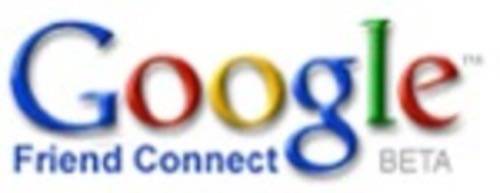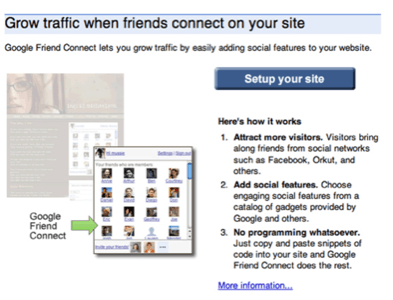Later tonight Google will launch a new service called Friend Connect, aiming to “bring the social” to any page around the web. Unfortunately the service takes a bunch of open technical standards yearning to see the light of day through mass adoption and puts them in a dark little box where they will struggle to breathe.

Google could have worked with other large companies and with the creators of these standards (some are in the Data Portability Working Group that Google joined, for example) to tackle the hard questions around data exposure, integration and privacy. Instead they are pushing their Open Social standard around in an iframe. Easy is very good, but co-operation could have come up with something better than this.
The Plan
Friend Connect uses OpenID, oAuth and Open Social to let users log in to their favorite apps using a trusted ID provider and then access their friend info from those apps – all while on another website altogether. That could be any website that has chosen apps from the Open Social/ Friend Connect app gallery and pasted the iframe code onto their page.
The embrace of these standards is great news – but the implementation is wanting.
If you’d like to hear the press call, we’ve got it up on our podcast site ReadWriteTalk, or you can listen to it in this wonderful iframe below (feel the social!). My questions come in at around 19:00, press the “play now” link to listen. The first part is boring and scripted but the Q&A part is pretty fun.
Who’s In?
Below is a splash page to-be for the Friend Connect service – you’ll notice that Facebook friends are included in the discussion. Facebook isn’t a participant in Open Social though, so we’re not clear on how they are a part of this Open Social In a Box Initiative. Google says it’s using the publicly available Facebook API. Google says that its Social Graph API, which indexes friends everywhere and that we called a creeping privacy violation – is not included in Friend Connect simply because they didn’t need it. It’s unclear on what information site owners will be able to put in their iframes.

You Can’t Use it Yet
While the whole developer and publisher world is anxiously awaiting details from the launch tonight, Google is putting a damper on adoption by limiting the Friend Connect “preview release” to a handful of white listed apps and a short list of selected websites. The company says it has to prove it can scale the infrastructure (ooh, can Google scale? I don’t know, better limit the approved users to just a tiny handful!) and it wants to see what kinds of features developers and site owners want to request. Apparently the company believes this feedback is best done by making said parties look from the outside and send emails guessing about what they’d like to see once they are let inside. This seems completely backwards to me.
You Can’t Touch What’s Inside the Magic Box
Site owners will be able to add Open Social apps to their web pages – sort of. They’ll be able to display them inside an iframe, a separate web page inside a webpage. They won’t be able to leverage that user data to change what they deliver themselves to their users.
Apps in an iframe may as well be a social sidebar ala Flock or Yoono. Those collections of social apps are probably more useful anyway.
Conversations Are Complicated
Google made it clear during their press call that they are aiming for the easiest, simplest and safest way to enable social apps to be integrated into other websites. It will take less than six months, they promise.
Let’s be clear that it’s not going to be easy to figure out how to enable all this user data to be mashed up in acceptably safe ways. We asked Google how they can assume that one user’s friends on IMeem have permission to access their info out on other sites around the web. They said that users will have to be given the option whether to expose that info to third party sites or not, something we haven’t seen any details on yet from the original source social networks. That would be even more difficult if the destination sites had read, much less write, access to that ported-in social networking data.
Everyone Is Talking, Though, Right?
Those hard questions are the ones that these companies are supposed to be working on together through the Data Portability Working Group, though. The Group has published best practices documents tackling a number of difficult questions already. Today when asked why all these companies were making separate announcements, though, Google said that the beauty of open standards is that companies don’t have to talk. They can just meet up around interoperable technologies.
We’re hoping that the biggest social companies in the world are talking, though. We’d like to see them complete and advance these standards, not just implement them by themselves, in a little box.
The Data Portability Working Group is a challengingsituation and it may not be a surprise that Google and the other large players aren’t spending as much time there as they are on engineering. The end results of the engineering though, are in this case and in the case of MySpace’s announcement earlier this week, appear a fair cry short of the dreams that fuel the data portability community.
We’d like to see the social truly opened up and for all the vendors and consultants, large and small, to work together to get through the permissioning and safety questions that ought be be just small bumps on the road to a universe of innovation.

















